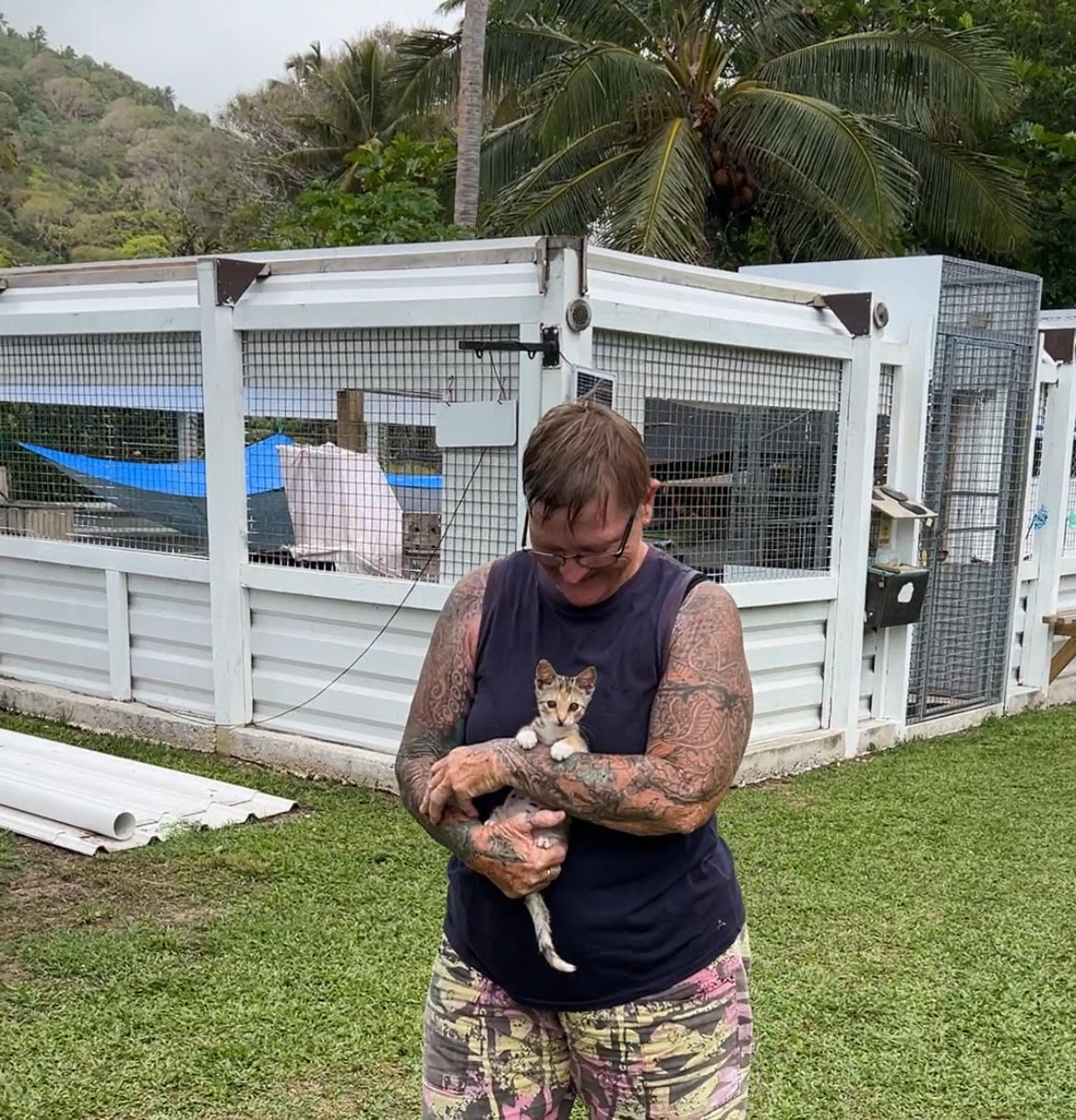Purr-fect solution: Desexing cats to save Rarotonga’s ecosystem
Thursday 18 January 2024 | Written by Candice Luke | Published in Features, Go Local, Weekend

Shannon Paul hopes to teach empathy to children through Paws n Claws new education hub being built this year. CANDICE LUKE/ 24011709
The ecosystem of Rarotonga will be at risk if the cat population is not controlled through desexing, warns Shannon Paul, the manager of Paws n Claws cat sanctuary.
“We live on an island that’s 34 kilometre around. If every cat decided to kill every gecko and every lizard, we would have an influx of insects like you can’t imagine.
“They would get on the crops, the farmers would come along and spray the crops. All of a sudden it leaches into the sandy soil and out into our world-famous lagoon. Boom! The ecosystem is fighting for its life.”
Paul says there is no way to desex all of the cats in Rarotonga as there are wild groups in the hills, but if 80 per cent of the population were neutered the island would regain control.
Last year Paws n Claws paid for four desexing days through Te Are Manu Vet Clinic. Sixty-eight (68) cats were neutered and another 11 were done on their most recent desexing day. This service was free to the public.
Paul encourages residents and businesses to muck in and help the cause by getting cats desexed whether they are pets or local strays.
But the animal lover discourages people from taking lives into their own hands. She has seen the grisly aftermath of animal abuse on the island: “We’ve had cats come in with their claws pulled out, their whiskers cut back to nothing, teeth have been smashed, I’ve had a cat with an eye missing.”
Paul says it’s all through a lack of education.
She wants to debunk myths about cats that have been passed down through generations.
“I can see how it develops. For example, if my grandmother didn’t want my father to have a cat, she’d say it’s riddled with diseases. We’ve had kids thinking they can’t breathe the same air as a cat.”
Paul recalls a time she put a kitten in the arms of an eight-year-old boy who dropped it in fright, after the kitten started purring. He had never heard a cat purr before.
“We will get there. We just need education. Humans are dependent on the animals that God put on this earth. They have a purpose and that is to help humans survive.
“The cat has a job. It is to keep rats and mice away. It is to keep as a companion. If you’re cold at night, who’s going to keep you warm? All of these things God created in this creature to give to human. Human needs to understand to give back. It’s a fair trade.”
The plight of the sanctuary has reached New Zealand, with the NZ High Commission in the Cook Islands set to fund the construction of an interactive learning hub to educate the community.
Through the facility children will learn about more than just cat population control.
“Kids can mingle with the cats without fear, learn about the cats, and learn about empathy.”
Paul believes that empathy in childhood creates healthier adults.
“They will learn that if they pull the whiskers off a cat, it hurts them. When children have empathy, you’ll find that they become a better student, a better worker, a better spouse, and when they have their own children the same will apply.”
Currently Paws n Claws is educating and providing a fun afternoon activity for the whole family with “Cuddles n Hugs” on Sundays. It’s been a hit with tourists.
Last weekend there were 17 visitors enjoying soft, fluffy hugs with the sanctuary residents.
“That’s the most rewarding part. I don’t personally have the time to cuddle every one of those kittens. Socialising our cats is the greatest reward they can give us.”
Paws n Claws has graciously received donations of cat biscuits and flea treatments. If tourists would like to bring donations from home, Paul says it’s better to bring light items like flea drops, worming treatments, and toys so as to not weigh down their baggage.
They can also arrange to have larger donations shipped over.
On Saturdays supporters can pop down to Punanga Nui Market from 8am to help the team sell Paws n Claws merchandise to raise funds: “We’ll even give you a t-shirt of your choice as a reward for helping us.”
Paul is grateful for Paws n Claws patron, Don Carlaw, for his support since the inception of the sanctuary.
“Don built this place. He built the sanctuary and the little shed, and pays to run it. Those are donations. We will never be able to pay him back for that.”
The sanctuary covers food and power, while Carlaw pays for rent and maintenance.
Paws n Claws are leaning further into their charitable status, seeking funding from local and international sponsorship to cover all overheads.
“We help where we can, but we need to start calling on our community businesses for sponsorship. Even if they were to donate $10 a month, if we’ve got 20 people giving $10 a month that covers the food bill for a week.”
Paws n Claws currently needs donations of flea treatment, worm treatment, kitten milk powder, baby wipes, and cat biscuits are always welcome.
The sanctuary was home to 61 cats at the time of publication.
“I’m hoping that Paws n Claws can make a change,” says Paul.




































